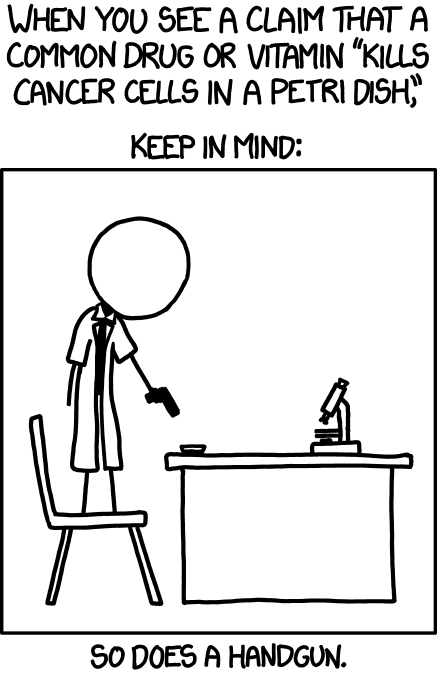In this study, the scientists simulated the process of spaced learning by examining two types of non-brain human cells — one from nerve tissue and one from kidney tissue — in a laboratory setting.
These cells were exposed to varying patterns of chemical signals, akin to the exposure of brain cells to neurotransmitter patterns when we learn new information.
The intriguing part? These non-brain cells also switched on a “memory gene” – the same gene that brain cells activate when they detect information patterns and reorganize their connections to form memories.
Memory is stored in the balls
Just to recap, sperm, pee, microplastics, and memories are stored in the balls? Am I missing anything? I can’t remember. Maybe my balls are too full of microplastics to recall.
Data.

I keep cement in mine
Mine are filled with brass
Live bees here
Yukon gold potatoes.
You forgot about the wolves.
i forgot i put those there to control the deer population
The Soul is also stored in the balls.
Do you think that’s why we often tell god that we’re cumming?
Urine is not stored in the balls. I’m a doctor you can trust me on this
Even if you weren’t a doctor I’d agree with you. I was taught it’s stored in the bladder in ninth grade. Pretty sure that continues throughout your adult life. Lol
I thought you were referencing the conversation on Reddit or Twitter or something where someone had said “I’m a doctor, pee is definitely not stored in the balls” and then a really long argument ensued where the dude was pretty adamant that pee is stored in the balls. I just wanted to be the Dr
deleted by creator
Still better that “pee is stored in the brain”
Well some species do potentially have “genetic memories” so maybe some stuff actually could be
😆
in a laboratory setting.

Not to be a debbie downer here, but it’s important to keep in mind that unless expressly stated otherwise, so-called discoveries that are only published in out-of-the-way (ie. not respected scientific journals) have usually not been peer reviewed or had their results replicated, which is the entire point of the scientific method.
Here’s the paper.
Awesome. Thanks!
Its interestng, but kidney cells are not exposed to patterns of neurotransmiters like nerve cells are. Cells can be reprogramed to be stem cells as well with the right pattern od signals but that does not mean that it really happens in the body.
“The Body Keeps the Score”
Isn’t the title misleading? A cell switching on the same gen neurons use to connect, if exposed to substance used to transmit information, doesn’t mean it stores or transmits any memories. It seems it doesn’t even do anything more, like forming dendrites or “answering” chemically.
Guess that’s just a side-effect of how the gen is exposed.
It’s more than that. People who have had heart transplants can inherit memories and personality traits from the donor. Cells remember more than they let on and can pass these memories to the recipient.
See this study. I think it’s safe to say we have some empirical evidence for this. In the linked study, there’s a kid who received a heart from another kid who died trying to retrieve a power ranger and somehow the donor knew that without anyone telling him. Another kid received a heart from a kid who drowned and he became afraid of water.
Sounds like utter bullshit to be honest with you.
At the bottom of that article you linked:
“Research data for this article Data not available / No data was used for the research described in the article”I’m all for implications but I think a little higher level of standards should be practiced since this is c/science.
The title is “misleading” because they’re not talking about visual/conscious mind memory as you’re doing here.
These non-brain cells also switched on a “memory gene” – the same gene that brain cells activate when they detect information patterns and reorganize their connections to form memories… "it suggests that in the future, we will need to treat our body more like the brain — for example, consider what our pancreas remembers about the pattern of our past meals to maintain healthy levels of blood glucose or consider what a cancer cell remembers about the pattern of chemotherapy.”
Furthermore, you’ve jumped onto anecdotal evidence and have declared it Empirical with your linked study
A literature review was performed to explore accounts of personality changes following heart transplantation … Further research is recommended.
That level of evidence would mean anyone claiming body transfers, alien abductions, past lives memories, etc etc would all be empirical data we must now scientifically accept.
I don’t see how you’re linking the two studies with the implied “It’s more than that”. The original study from OP is declaring nothing about actual memories that we’re “consciously using” being stored in other parts of the body. It’s stating they believe cells have “memory mechanisms” to better function, like a processor getting it’s own memory cache (that data storage is used for it’s processing purpose and isn’t included with your harddrive access).
They are a little deceiving/misleading with the article as well,
The goal of the research was straightforward — to investigate if non-brain cells contribute to memory… They ingeniously engineered the non-brain cells to generate a glowing protein, which indicated whether the memory gene was active or dormant… Not only does this research on non-brain cells introduce fresh perspectives to study memory, but it also holds promise for potential health-related benefits.
They tested a gene by bombarding cells with chemical cocktails, showing the gene can be activated. It’s a giant leap to then say we have empirical data that we store memories throughout our bodies.
“Muscle memory” is real.
It seem like they’re just saying kidneys remember kidney stuff, pancreases just remember pancreas stuff, etc etc.
It’s not like your kidney remembers Aunt Jean has a mole on her nose.
There is another body of research that deals with a person’s behavior can be heavily influence by endocrine actions. Organs can affect current endocrine responses. So there is a suggestion here that your kidney may not remember the Aunt Jean has a mole, it may remember why it releases certain hormones which can effect how you behave.
I dunno. We (both my wife and I) can and have had long conversations with my gut (when there’s a rumbly in my tumbly you can hear it across a crowded room) and my gut seems to remember shit. It also has a strange fascination with cheese.
That sounds like a fun life/wife.
I am a very lucky person, and she is. It’s kind of like when you have a conversation with your meowbox of an orange tabby.
Yeah last week people on Lemmy were arguing that memory is the simplest thing to exist EVER and that musk’s neuralink meant we had matrix reloaded already at the corner
The hubris never ceases to amaze me
Musk is a snake oil salesman that buys other people’s ideas and pays smart people to make it, then steals all the profits for himself.
Modern day Thomas Edison.
Except he hasn’t electrocuted a live elephant to make a point. Yet.
In related news:
The complications include bloody diarrhea, partial paralysis, and cerebral edema, a condition colloquially known as “brain swelling.”
Read something like that in an old science fiction novel.
Old man’s brain is placed in a young woman’s body. Her brain was destroyed but most of her memories live on in her body.
Robert Heinlein, I Will Fear No Evil
“Elderly billionaire Johann Sebastian Bach Smith is being kept alive through medical support and decides to have his brain transplanted into a new body. He advertises an offer of a million dollars for the donation of a body from a brain-dead patient. Smith omits to place any restriction on the sex of the donor, so when his beautiful young female secretary, Eunice Branca, is killed, her body is used—without his knowledge and to the distress of some of those around him.”
You can tell it’s a really old book because they talk about $1 million like it’s a lot of money.
I’d read that novel.
Old man hell bent on world domination, but really wants Johnny in math class to ask him to the dance on Friday.
"I Will Fear No Evil, " Robert Heinlein.
One of Iain M. Banks’ Culture novels has an exceptionally old character who is so exceptionally old that he’s had to turn most of his body into memory storage (sounds weird if you think in terms of computers) to keep remembering things. He stores his sexy memories in his balls.
Don’t remember that char, can you refresh my memory (I am fully aware of the irony given the topic under discussion)
He’s in Hydrogen Sonata. The mcguffin guy who everyone is trying to find and talk to because he’s the only person who’s old enough to remember some very important thing about the early days of the Culture.
Isn’t this literally the plot to the Reanimator?
Well, it’s certainly the plot of Assassin’s Creed
So hold on a minute - does this mean there might be some truth to the whole “eat your fallen enemy to gain experience” thing? That’s wild.
Eating a dictionary to improve your vocabulary would be equally effective to that theory, and for many of the same reasons. (As far as information transfer is concerned)
No, because you’re eating the flesh, so you’re digesting it.
This is more relevant to organ transplants.
Apparently, it’s a known phenomenon that some organ transplant recipients seem to inherit some traits and even memories of organ donors.
Kwisatz Haderach here we come
I was wondering if there is a link between cellular memory and how trauma is encoded into DNA?
deleted by creator












